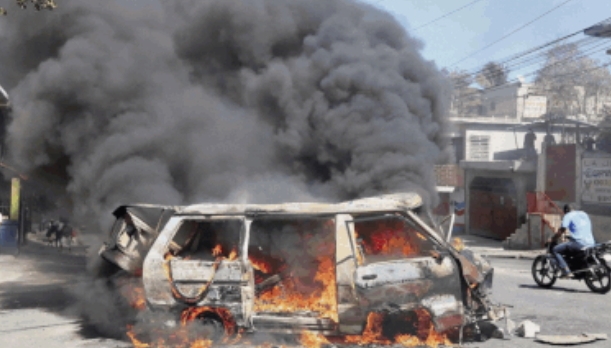Thousands of Haitians protested in Port-au-Prince demanding government action to combat gang violence. The protest, initially peaceful, turned violent with gunfire and clashes with police. Gangs control most of the capital, displacing over a million people and worsening the country’s economic and humanitarian crisis. The UN mission has been ineffective, and widespread violence, including extortion and killings, continues.
Haitians Demand Government Action Amid Rising Gang Violence


Thousands of Haitians took to the streets of the capital, Port-au-Prince, on Wednesday, demanding that the government take immediate action to ensure their safety amid the relentless surge of gang violence.
“We came here to give them [the government] our demands. We demand freedom, we demand security. We need to be able to work and save our country,” declared one protester.
Many demonstrators carried tree boughs or palm fronds as symbols of their movement, while others wielded machetes and firearms. Meanwhile, schools, banks, and various businesses remained shut across the city due to the prevailing unrest.
Initially, the protests were peaceful, but the situation took a violent turn later in the day as gunfire erupted, sending bullets whizzing through the air. The deafening sounds caused widespread panic, prompting the large crowd to scatter in fear. Confrontations between protesters and the police ensued, intensifying the chaos.
In a further display of anger, protesters set tires ablaze, using them to block roads as they chanted, “Let’s go, let’s go, let’s go, and get them out.”
This marks the first significant protest against the administration of Prime Minister Alix Didier Fils-Aimé, who was appointed in November. His government is facing mounting frustration from the public over its inability to curb gang control, which has now spread across nearly all of Port-au-Prince and its surrounding regions.
The transitional government has struggled to rein in the armed gangs, and the limited United Nations-backed security mission—already undermanned and underfunded—has done little to halt their advances.
The rampant violence has displaced over a million people, deepening the country’s economic paralysis and exacerbating mass hunger. Gangs have also been accused of widespread extortion, mass rapes, and brutal killings, further fueling the crisis.
During a visit to Port-au-Prince in early March, William O’Neill, the United Nations human rights commissioner’s expert on Haiti, described the city as “an open-air prison,” emphasizing that there was no safe way to enter or exit the capital except by helicopter.
A recent UN report underscores the severity of the crisis, revealing that more than 4,200 people were reported killed across Haiti between July and February, while an additional 1,356 were injured.

 বাংলা
বাংলা  Spanish
Spanish  Arabic
Arabic  French
French  Chinese
Chinese 
